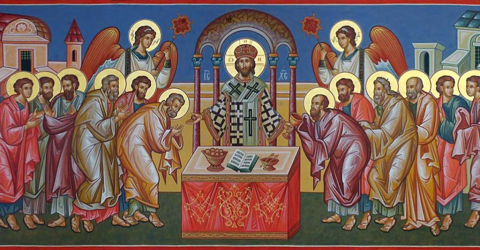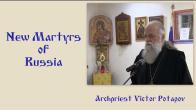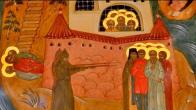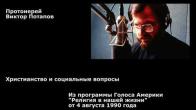You are here
ON HOLY COMMUNION OF THE BODY AND BLOOD OF THE SAVIOR

Metropolitan Hilarion (Alfeyev) of Volokalamsk
(For Great Thursday)
“Whoso eateth My Flesh, and drinketh My Blood, dwelleth in Me, and I in him.” [John 6:56] In those words, the Lord speaks of two things: of His being in us and of our being in Him. The Lord abides in us for He became man, assuming human flesh. In His Incarnation, he took on the flesh not of abstract humanity, but of every individual person. He assumed the flesh of each and every one of us. We abide in Him, for we take His Flesh into ourselves. It is the human flesh of the Incarnate Son of God, the very same flesh He took from us, and which, united with His Divinity, became completely deified. Through this intercommunion we become “in Him”: a material ontological union between us and God takes place. The barrier between God and man, created by human hands, was demolished by the hands of God, demolished with God’s Incarnation and His Mystical Supper, when He offered Himself as food and drink for us.
In the Canon that is read at Matins for Great Thursday we hear, “O God, the Lord and Creator of all, Thou art become poor, uniting a created nature to Thyself, while remaining free from passion. Since Thou art the Passover, Thou hast offered Thyself to those for whose sake Thou wast soon to die; and Thou hast cried: ‘Eat My Body, and ye shall be firmly established in the faith.’’ [Irmos, Canticle 3]. This is what those words mean: becoming poor, the Lord, the Creator of the universe and of each person impoverished himself, took upon Himself our human flesh and in so doing united us to Himself, brought Himself as a sacrifice for us as the New Pascha. He says to us: partake of My Body, and be confirmed in faith. Faith that our salvation is accomplished by Christ, faith that the chasms separating man from God no longer exist, faith that in communing of the Body and Blood of Christ, we are united to God both physically and spiritually.
The first to commune of God was the Most-holy Theotokos. When the Lord was Incarnate, He entered the womb of the Most-holy Virgin, and she took into herself the Body of God Incarnate. That is spoken of in the Canon for Great Thursday: “Cause of all and Bestower of life, the infinite Wisdom of God has built His house, from a pure Mother who has not known man. For, clothing Himself in a bodily temple, Christ our God is greatly glorified.” That is to say, Wisdom, which created the world, Which is the cause of all and the giver of life, created a temple for Itself, in the Most-pure Virgin, who had not known a husband. It is not coincidental that when we prepare for Holy Communion and when we give thanks after Holy Communion, we address in prayer not only the Lord, but also His Most-pure Mother, for she became the first temple in which Divinity took up residence. Following after her, we take within ourselves the Incarnate God, thereby becoming communicants of life eternal, of the Heavenly Bread, of the New Drink and the New Pascha, which is our Incarnate Lord Jesus Christ Himself.
According to the teachings of Sts. John Chrysostom, Cyril of Alexandria, Symeon the New Theologian, and other Fathers of the Church, in communing of the Holy Gifts of Christ, we become “relatives” of God, “sharers in One Body,” blood-kin with Him; we become brothers and friends of God. According to St. Ignatius of Antioch, in Communing, we become “God-bearers,” and “Christ-bearers.” Communion leads us to salvation and theosis, both spoken of in the Canon for Great Thursday: ‘In My Kingdom,’ Thou hast said, O Christ, to Thy friends, ‘I shall drink a new drink beyond your understanding; I shall be with you as God among gods. For the Father has sent Me, His only-begotten Son, to cleanse the world from sin.’” The Lord became an actual person and in assuming actual human flesh, He deified our human nature. That is why, in Communing of the Holy Gifts of Christ, we become by grace that which He is by nature, “gods by grace.”
Once, upon returning to his cell after Communion, St. Symeon the New Theologian saw that his hands had become the hands of God, and that his entire body had become the Body of God, and that every single particle, every single cell of his earthly, human, corruptible body had been united with Divinity, and had been permeated with Divine Light. It is no coincidence that in preparing for Holy Communion, we read St. Symeon’s prayer, “From sullied lips, from an abominable heart, from an unclean tongue, out of a polluted soul....” It is with his words that we pray as we prepare for having our body, soul and heart become the Temple of the Divine. We ask him to help us be at least to some extent like he was, for Communion and theosis are granted to those who commune worthily, while for those who commune unworthily, Communion is “unto judgment and condemnation.”
Who communes unworthily? Those who consciously violate God’s Commandments, oppose the rules of the church, come to God’s Temple and receive the Holy Mysteries, but in their hearts bear hatred toward their neighbors. Judas was one such unworthy communicant. He attended the Mystical Supper, and “the glorious disciples were illumined at the Supper during the washing of the feet, but ungodly Judas was darkened by the disease of avarice....” When approaching the Holy Chalice, we should remember that, as the Holy Apostle Paul says, “For he that eateth and drinketh unworthily, eateth and drinketh damnation to himself, not discerning the Lord’s body.” We should remember that in accepting into ourselves God’s Body and Blood, we assume great responsibility for our personal future. For if the Name of God does not shine forth through us, if the Body and Blood of Christ, which we receive as light, should become for us a consuming fire, then woe unto us, for we will be like unto the traitor Judas.
Is not the meaning of “sufferings of Hades” the fact that man finds himself with God, but that the very presence of God becomes for him an unbearable weight and torment? And was not that presence at the Mystical Supper such an inexpressible torture for Judas? After all, his soul was divided: perhaps some part of his soul yet remained with the Lord, while another part had already given itself over to the Devil. Sitting at the same table with his Teacher, in his heart he was already carrying out his plan to betray Him.
We should not forget this awful lesson. Even if we often commune, even if we carefully prepare for Holy Communion, we must remember that in the matter of God, being divided is impermissible. Approaching the Holy Chalice, we should desire with our whole heart and mind, our entire being, and even with our body, to be united with the Lord. We should want to give our life to God, devoting every breath, sense, thought, and action to Him. Only then will we be worthy communicants, only then will we be like the Most-holy Theotokos, will we become a temple of Divinity, only then will we be worthy of deification, to which each of us is called.
Our entire service today speaks to us about that deification. When in the present life we commune of the Body and Blood in the appearance of bread and wine, we hope that in the life to come, we will commune of God even more fully, more perfectly. As we will sing on the night of Pascha, “Grant us to partake of Thee more fully in the unwaning day of Thy Kingdom.”
The blissful happiness found in Paradise is the fact that people abide in God, and God in them. For those in Paradise, this union with Him is a source of never-ending joy, of inexhaustible happiness, of inexpressible bliss. As to those who are unworthy of that bliss, God abides in them, but they are outside Him, and it is that which becomes for them a source of never-ending torment.
Let us keep all of that in mind when we commune of the Holy Mysteries of Christ, let us “discern” the Body and Blood of the Lord. Let us prepare for Holy Communion not only by observing the fast and reading the appointed prayers, but first and foremost by devoting all our life, all our works, and ourselves to God. Receiving into ourselves the Holy Mysteries, let us bear them worthily, carefully, piously, as the Most-holy Theotokos bore the Infant Christ within her womb. Let us ask God that we might be able to commune of the Holy Mysteries of Christ until the end of our days on earth, that on the day of our death we might not be deprived of Holy Communion, and that in life eternal we might be worthy to commune of God “in the never-ending day of His Kingdom.” Amen.
Address of our Cathedral
Subscribe to our mailing list
While all the materials on this site are copyrighted, you may use them freely as long as you treat them
with respect and provide attribution on the Russian Orthodox Cathedral of St.John the Baptist of Washington DC.









